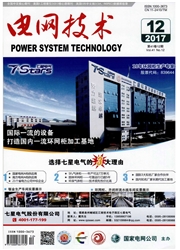

 中文摘要:
中文摘要:
面对大规模风电并网运行时接入容量受限、弃风量大的情况,通常的做法是考虑利用储能系统来提高电网接纳风电能力,但如何评价其整体效益是必须解决好的问题。为此分析了抽水蓄能系统的投资成本、经济效益及其运行约束,揭示了风电-抽水蓄能联合系统综合效益和储能容量之间在地区电力系统最优化运行条件下的随动机理,建立了求取综合效益的数学模型,提出了综合效益的评价方法。该方法基于相互匹配的火电机组出力曲线、风功率曲线和电网负荷特性,结合火电机组装机情况,并利用系统频率与负荷或发电变化之间的关联关系,量化分析了抽水蓄能系统的容量、运行年限、成本、收益等因素的变化对综合效益和风电接纳容量的影响。实例分析表明文中所提评价方法是有效的。
 英文摘要:
英文摘要:
In allusion to restricted grid-connected capacity and high wind power curtailment when large-scale wind farm is grid-connected, in usual it is considered to improve power grid's ability of accommodating wind power by energy storage system, however how to evaluate the overall efficiency of the hybrid wind power-pumped storage system is the problem to be solved well. For this reason, the investment cost, economic benefit of pumped storage system and its operational constraints are analyzed, thus the follow-up mechanism between comprehensive benefits of hybrid wind power-pumped storage system and energy storage capacity under optimized operating condition of regional power grid is revealed, and a mathematical model to solve the comprehensive benefits is established and a method to evaluate the comprehensive benefits is proposed. Based on output curves of mutually matched thermal generation units, wind power and load characteristics of power grid and combining with the installation capacity of thermal generation units and utilizing the incidence relation between system frequency and load (or the change of power generation), the proposed method quantitatively analyzes the impacts of the change of such factors of pumped storage station as its capacity, service life, cost and revenue on comprehensive benefits and power grid's accommodation ability of wind power. Case analysis shows that proposed evaluation method is effective.
 同期刊论文项目
同期刊论文项目
 同项目期刊论文
同项目期刊论文
 期刊信息
期刊信息
